人教课标必修五Unit1 Great scientists Warming up(共34张PPT)
文档属性
| 名称 | 人教课标必修五Unit1 Great scientists Warming up(共34张PPT) | 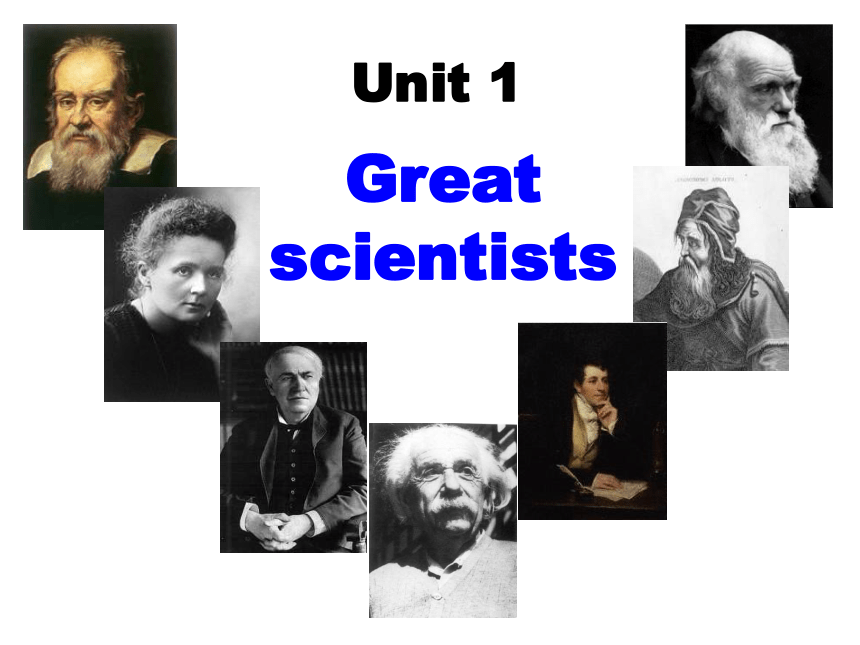 | |
| 格式 | zip | ||
| 文件大小 | 4.6MB | ||
| 资源类型 | 教案 | ||
| 版本资源 | 人教版(新课程标准) | ||
| 科目 | 英语 | ||
| 更新时间 | 2015-03-19 22:53:14 | ||
图片预览

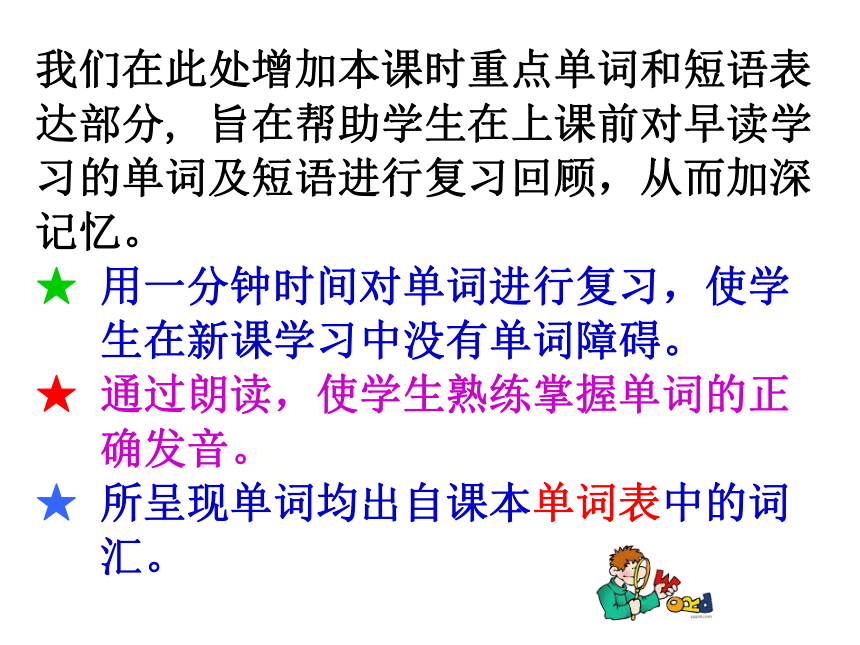
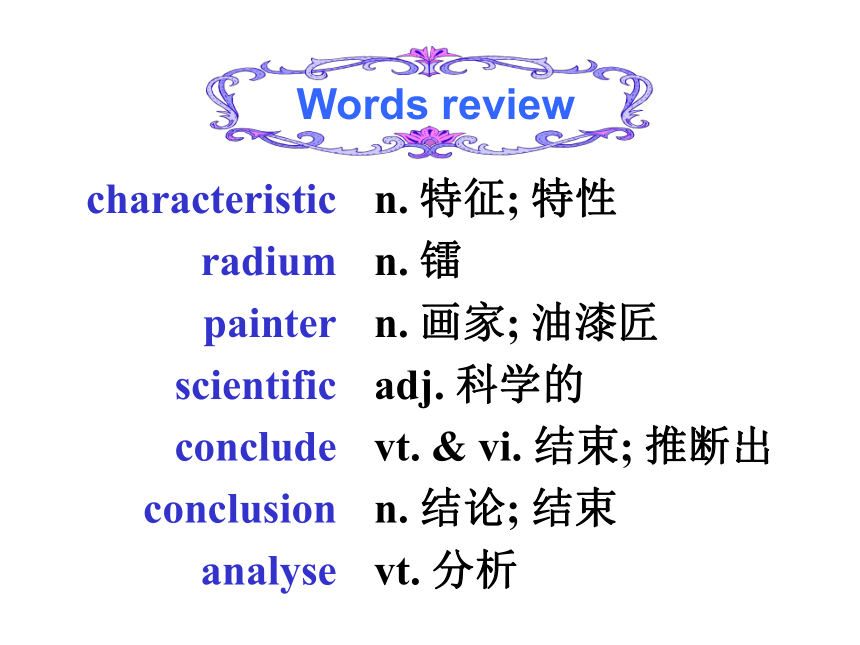

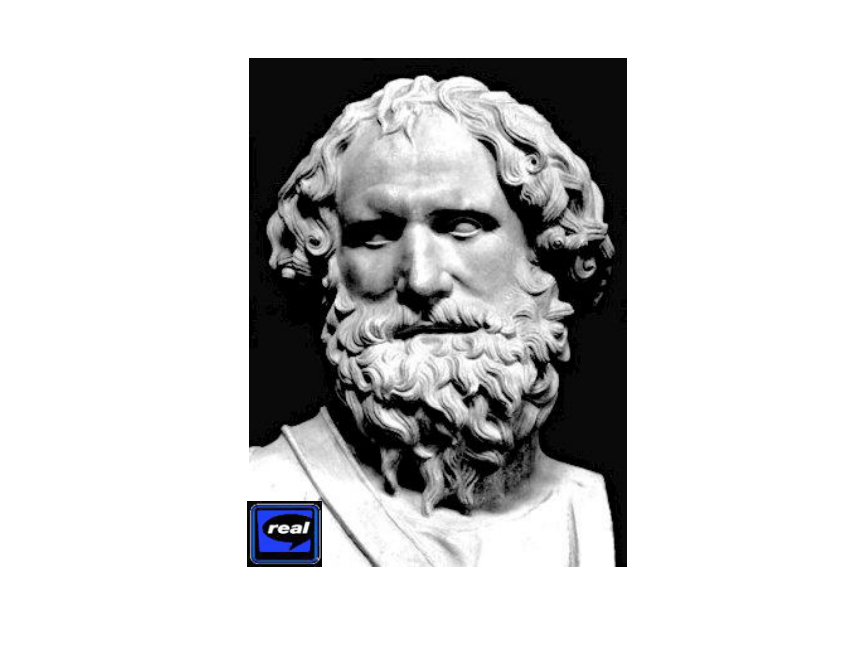
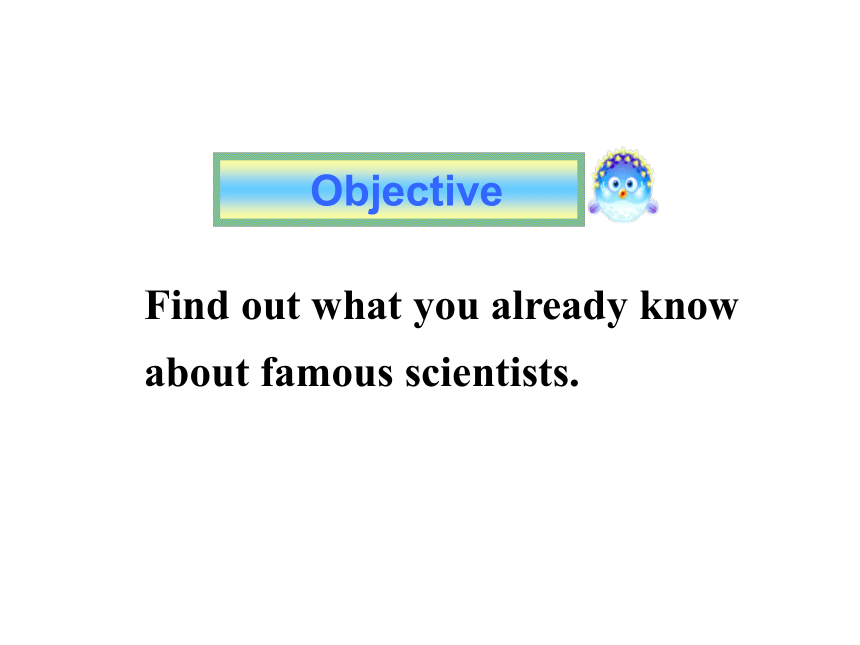
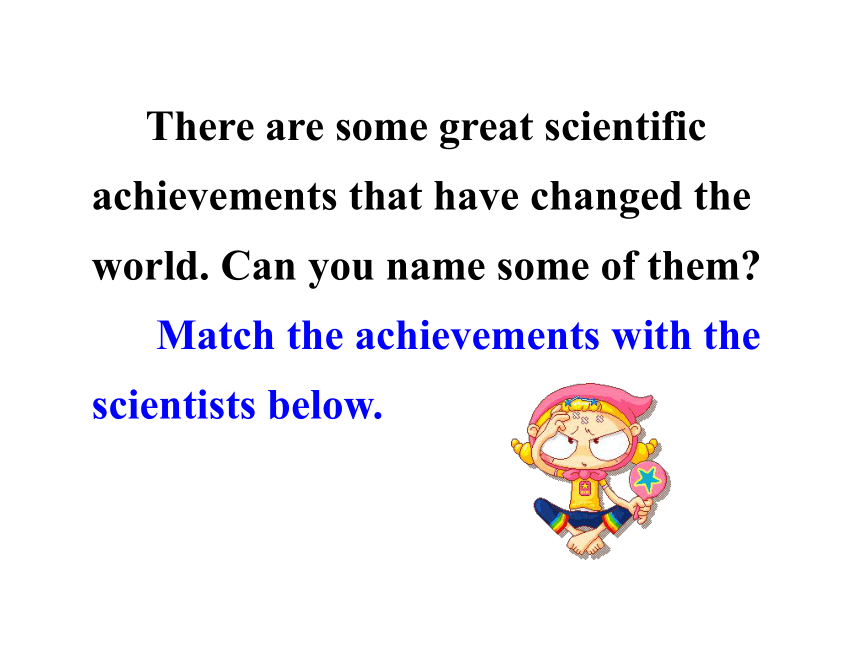
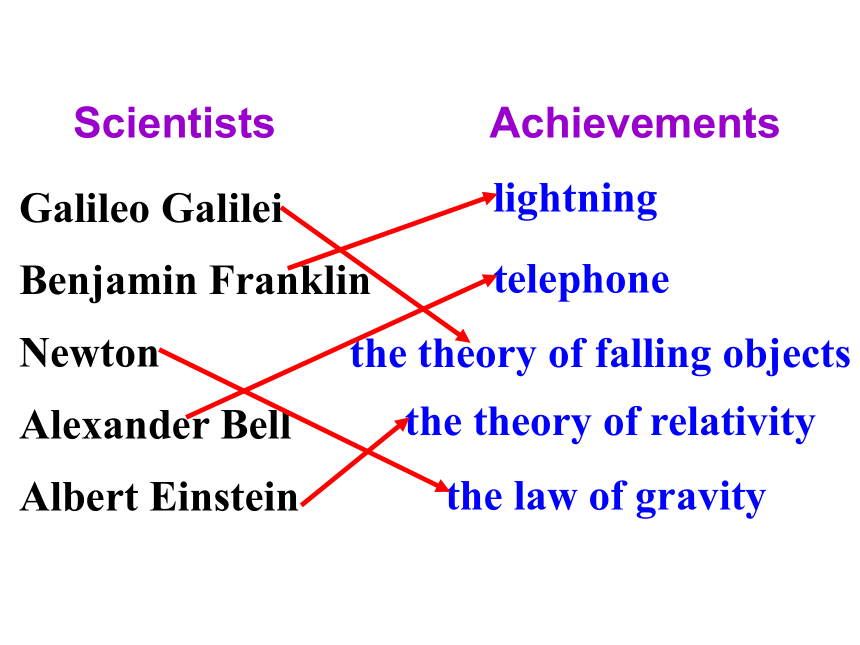
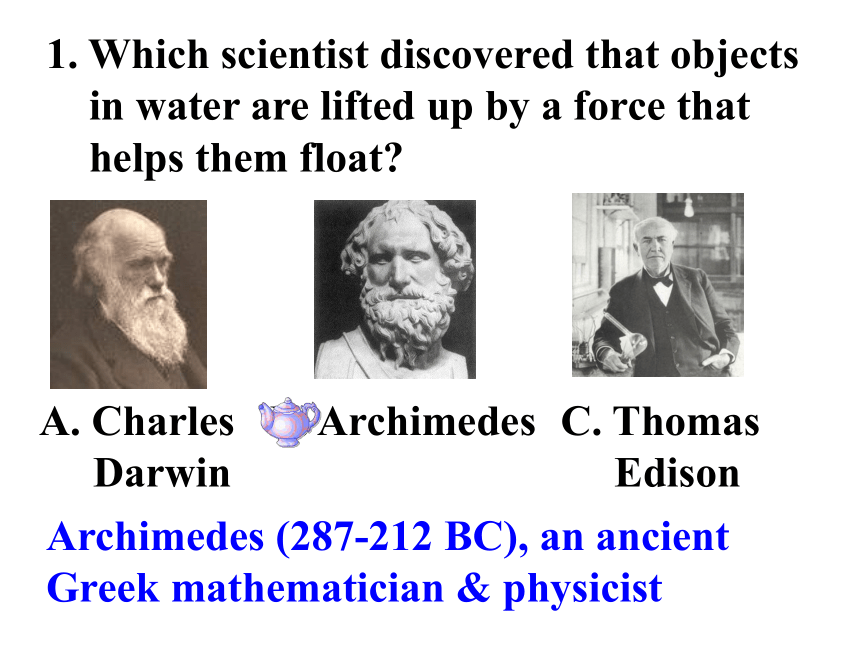
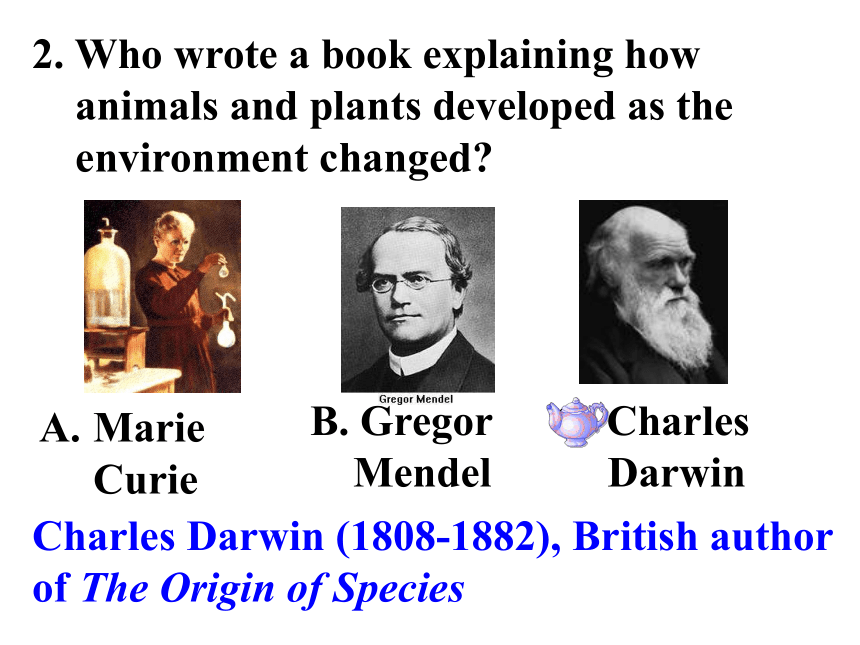
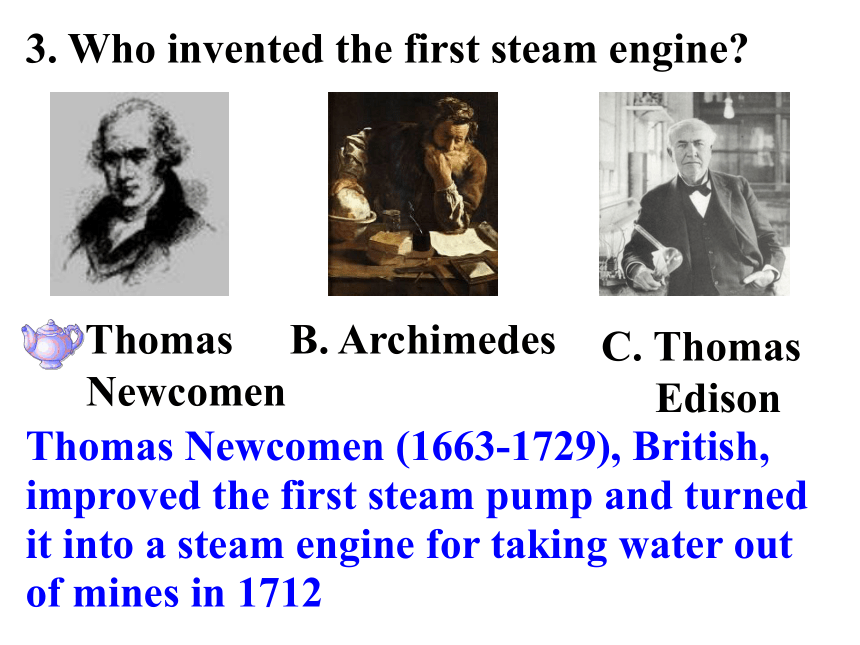
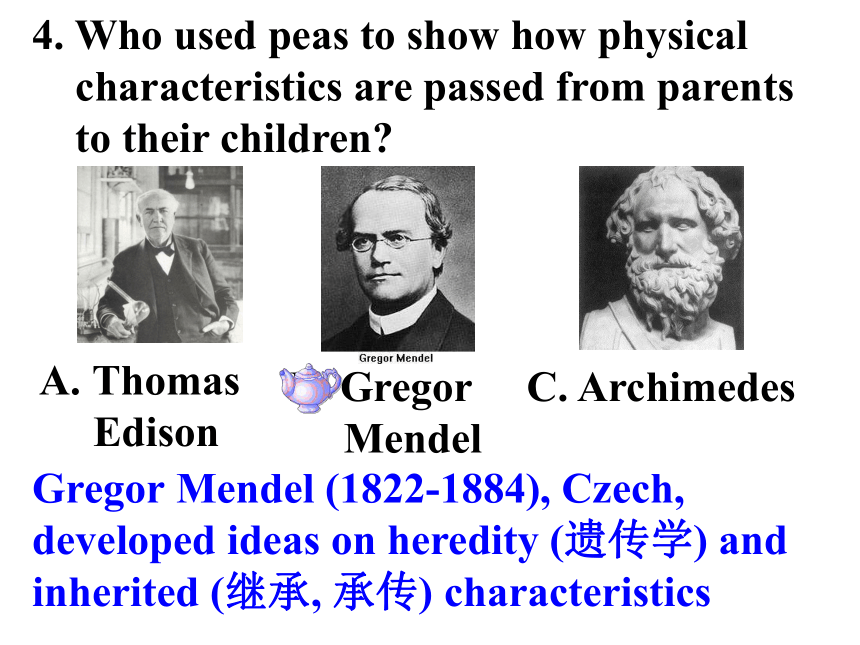
文档简介
课件34张PPT。Unit 1Great
scientists我们在此处增加本课时重点单词和短语表达部分, 旨在帮助学生在上课前对早读学习的单词及短语进行复习回顾,从而加深记忆。
★ 用一分钟时间对单词进行复习,使学
生在新课学习中没有单词障碍。
★ 通过朗读,使学生熟练掌握单词的正
确发音。
★ 所呈现单词均出自课本单词表中的词
汇。characteristic
radium
painter
scientific
conclude
conclusion
analysen. 特征; 特性
n. 镭
n. 画家; 油漆匠
adj. 科学的
vt. & vi. 结束; 推断出
n. 结论; 结束
vt. 分析Words reviewput forward
draw a conclusion提出
得出结论Expressions reviewObjectiveFind out what you already know about famous scientists. There are some great scientific achievements that have changed the world. Can you name some of them?
Match the achievements with the scientists below. Galileo Galilei
Benjamin Franklin
Newton
Alexander Bell
Albert Einsteinthe theory of falling objectslightningthe law of gravitytelephone Scientists Achievementsthe theory of relativity1. Which scientist discovered that objects
in water are lifted up by a force that
helps them float?B. ArchimedesC. Thomas
EdisonA. Charles
DarwinArchimedes (287-212 BC), an ancient Greek mathematician & physicist2. Who wrote a book explaining how
animals and plants developed as the
environment changed? Marie
CurieC. Charles
DarwinB. Gregor
MendelCharles Darwin (1808-1882), British author
of The Origin of Species 3. Who invented the first steam engine? Thomas
NewcomenC. Thomas
EdisonB. ArchimedesThomas Newcomen (1663-1729), British,
improved the first steam pump and turned
it into a steam engine for taking water out
of mines in 17124. Who used peas to show how physical
characteristics are passed from parents
to their children? Thomas
EdisonC. ArchimedesB. Gregor
MendelGregor Mendel (1822-1884), Czech, developed ideas on heredity (遗传学) and inherited (继承, 承传) characteristics5. Who discovered radium?C. Marie CurieB. NewtonA. Zhang HengMarie Curie (1867-1934), Polish and French, won two Nobel prizes6. Who invented the way of giving electricity
to everybody in large cities? Stephen
Hawking C. Thomas
EdisonB. ArchimedesThomas Edison (1847-1931),
American inventorThomas
EdisonInventions of Thomas Edison Phonograph 留声机Light bulbmotion picture camera7. Who was the painter that studied dead
bodies to improve his painting of people? Gregor
MendelC. Marie
CurieB. Leonardo
da Vinci Leonardo da Vinci (1452-1519), Italian artistLeonardo da Vinci’s paintings 8. Who invented a lamp to keep miners safe
underground? Sir Humphry
Davy C. FaradayB. Thomas
NewcomenSir Humphry Davy (1778-1829), British,
discovered the medicinal value of nitrous oxide (一氧化二氮) as an anaesthetic (麻醉剂)9. Who invented the earliest instrument to
tell people where earthquakes happened? Charles
DarwinC. Watt B. Zhang
HengZhang Heng (78-139), Chinese, invented the first seismographseismograph地动仪10. Who put forward a theory about black
holes? Stephen
HawkingC. CopernicusB. ArchimedesStephen Hawking (1942- ), British scientist,
worked in astronomy and studied black holes in spaceThe quotes below are from some famous scientists.
Do you know their meanings?Imagination is more important than
knowledge.“想象力比知识更重要。”Albert EinsteinGenius is one percent inspiration and ninety-nine percent perspiration.“天才就是百分之九十九的汗水
加上百分之一的灵感。”Thomas Alva Edison Marie CurieNothing in life is to be feared, it is only to be understood.“生活中没有什么可怕的东西,只有需要理解的东西。”It takes a very unusual mind to undertake analysis of the obvious.Alfred Whitehead “分析明显存在的事物需要非凡的
头脑。”What makes a
scientist successful?strong willimaginationcreativitypatiencepersistencecarefulnesscuriosity… Do you know how to prove a new idea in scientific research?
Discuss in small groups the stages in setting out a new scientific idea.
What order would you put them in?Draw a conclusion Think of a method Collect results Make a question
Find a problem Analyse the results
Find supporting evidence Infectious diseases can be spread
to other people. They have an unknown
cause and need public health care to
solve them.
People may be exposed to infectious
diseases, so may animals. Bird flu,
AIDS and SARS are infectious diseases.
Infectious diseases are difficult to cure. What do you know about infectious diseases?What do you know about cholera? Cholera is the illness caused by a bacterium (细菌) called Vibrio cholerae. It infects people’s intestines (肠), causing diarrhea (腹泻), vomiting and leg cramps. The most common cause of cholera is by someone eating food or drinking water that has been infected with the bacteria. Great BritainGermanyDeath of first cholera case in London during the 1848-49 epidemic LondonPrevious cholera epidemic in Great Britain in 1831-32The spread of choleraHomework Write a passage about one
of your favourite scientists
in about 100 words.
2. Preview the Reading:
JOHN SNOW DEFEATS
“KING CHOLERA”Thank you!
scientists我们在此处增加本课时重点单词和短语表达部分, 旨在帮助学生在上课前对早读学习的单词及短语进行复习回顾,从而加深记忆。
★ 用一分钟时间对单词进行复习,使学
生在新课学习中没有单词障碍。
★ 通过朗读,使学生熟练掌握单词的正
确发音。
★ 所呈现单词均出自课本单词表中的词
汇。characteristic
radium
painter
scientific
conclude
conclusion
analysen. 特征; 特性
n. 镭
n. 画家; 油漆匠
adj. 科学的
vt. & vi. 结束; 推断出
n. 结论; 结束
vt. 分析Words reviewput forward
draw a conclusion提出
得出结论Expressions reviewObjectiveFind out what you already know about famous scientists. There are some great scientific achievements that have changed the world. Can you name some of them?
Match the achievements with the scientists below. Galileo Galilei
Benjamin Franklin
Newton
Alexander Bell
Albert Einsteinthe theory of falling objectslightningthe law of gravitytelephone Scientists Achievementsthe theory of relativity1. Which scientist discovered that objects
in water are lifted up by a force that
helps them float?B. ArchimedesC. Thomas
EdisonA. Charles
DarwinArchimedes (287-212 BC), an ancient Greek mathematician & physicist2. Who wrote a book explaining how
animals and plants developed as the
environment changed? Marie
CurieC. Charles
DarwinB. Gregor
MendelCharles Darwin (1808-1882), British author
of The Origin of Species 3. Who invented the first steam engine? Thomas
NewcomenC. Thomas
EdisonB. ArchimedesThomas Newcomen (1663-1729), British,
improved the first steam pump and turned
it into a steam engine for taking water out
of mines in 17124. Who used peas to show how physical
characteristics are passed from parents
to their children? Thomas
EdisonC. ArchimedesB. Gregor
MendelGregor Mendel (1822-1884), Czech, developed ideas on heredity (遗传学) and inherited (继承, 承传) characteristics5. Who discovered radium?C. Marie CurieB. NewtonA. Zhang HengMarie Curie (1867-1934), Polish and French, won two Nobel prizes6. Who invented the way of giving electricity
to everybody in large cities? Stephen
Hawking C. Thomas
EdisonB. ArchimedesThomas Edison (1847-1931),
American inventorThomas
EdisonInventions of Thomas Edison Phonograph 留声机Light bulbmotion picture camera7. Who was the painter that studied dead
bodies to improve his painting of people? Gregor
MendelC. Marie
CurieB. Leonardo
da Vinci Leonardo da Vinci (1452-1519), Italian artistLeonardo da Vinci’s paintings 8. Who invented a lamp to keep miners safe
underground? Sir Humphry
Davy C. FaradayB. Thomas
NewcomenSir Humphry Davy (1778-1829), British,
discovered the medicinal value of nitrous oxide (一氧化二氮) as an anaesthetic (麻醉剂)9. Who invented the earliest instrument to
tell people where earthquakes happened? Charles
DarwinC. Watt B. Zhang
HengZhang Heng (78-139), Chinese, invented the first seismographseismograph地动仪10. Who put forward a theory about black
holes? Stephen
HawkingC. CopernicusB. ArchimedesStephen Hawking (1942- ), British scientist,
worked in astronomy and studied black holes in spaceThe quotes below are from some famous scientists.
Do you know their meanings?Imagination is more important than
knowledge.“想象力比知识更重要。”Albert EinsteinGenius is one percent inspiration and ninety-nine percent perspiration.“天才就是百分之九十九的汗水
加上百分之一的灵感。”Thomas Alva Edison Marie CurieNothing in life is to be feared, it is only to be understood.“生活中没有什么可怕的东西,只有需要理解的东西。”It takes a very unusual mind to undertake analysis of the obvious.Alfred Whitehead “分析明显存在的事物需要非凡的
头脑。”What makes a
scientist successful?strong willimaginationcreativitypatiencepersistencecarefulnesscuriosity… Do you know how to prove a new idea in scientific research?
Discuss in small groups the stages in setting out a new scientific idea.
What order would you put them in?Draw a conclusion Think of a method Collect results Make a question
Find a problem Analyse the results
Find supporting evidence Infectious diseases can be spread
to other people. They have an unknown
cause and need public health care to
solve them.
People may be exposed to infectious
diseases, so may animals. Bird flu,
AIDS and SARS are infectious diseases.
Infectious diseases are difficult to cure. What do you know about infectious diseases?What do you know about cholera? Cholera is the illness caused by a bacterium (细菌) called Vibrio cholerae. It infects people’s intestines (肠), causing diarrhea (腹泻), vomiting and leg cramps. The most common cause of cholera is by someone eating food or drinking water that has been infected with the bacteria. Great BritainGermanyDeath of first cholera case in London during the 1848-49 epidemic LondonPrevious cholera epidemic in Great Britain in 1831-32The spread of choleraHomework Write a passage about one
of your favourite scientists
in about 100 words.
2. Preview the Reading:
JOHN SNOW DEFEATS
“KING CHOLERA”Thank you!
